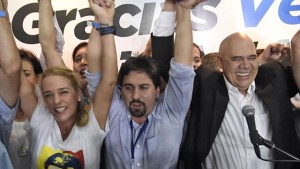 Venezuela’s opposition has won an overwhelming victory in parliamentary elections in the oil-rich nation, which is mired in economic turmoil and violent crime.
Venezuela’s opposition has won an overwhelming victory in parliamentary elections in the oil-rich nation, which is mired in economic turmoil and violent crime.
Candidates for the centre-right opposition seized a majority in the national assembly, with most of the results in, marking a major political shift in the country, which set out on a leftist path in 1999 under the late president Hugo Chavez and his project to make Venezuela a model of what he called “21st century socialism”.
Five hours after polls closed the electoral commission said that the opposition had won 99 of the 167 seats in the national assembly. The socialist party won 46. Twenty-two additional seats were still undecided.
Analysis Venezuela election points to a rejection of populism, not the ‘pink tide’
Nicolás Maduro’s Socialists were not rejected on ideological grounds, but on grounds of economic incompetence
Fireworks burst in the sky above Caracas as election officials announced partial results of the vote, indicating the opposition coalition Democratic Unity Roundtable (MUD) had broken the dominion the ruling United Socialist Party of Venezuela (PSUV) has held on the legislature for 16 years.
“Venezuela wanted a change and today that change has begun,” said Jesus Torrealba, leader of the MUD coalition.
“The results are as we hoped. Venezuela has won. It’s irreversible,” tweeted Henrique Capriles, a former presidential candidate and one of the leading figures in the coalition.
President Nicolás Maduro said his government would “recognize these adverse results and accept them”.
However, he said the outcome of the election did not mean an end to the “Bolivarian revolution” he inherited from Chávez who died in 2013 from cancer.
“We have lost a battle today but now is when the fight for socialism begins,” he said in a late night address.
Various opposition sources predicted that once counting was finalised, they would win as many as 113 seats. That would give them a crucial two-thirds majority needed to shake up institutions such as the courts or election board.
The opposition victory deals a serious blow to the socialist revolution started 17 years ago by the late Hugo Chavez, who until his death in 2013 had an almost-magical hold on the political aspirations of the country’s long-excluded masses.
The vote was seen as a referendum on Maduro’s handling of the country, which despite having the world’s largest oil reserves, faces chronic shortages of basic foods, inflation in the triple digits and a wave of violent crime.
The government says much of the country’s woes are the result of a “economic war” being waged against the government by the opposition and the United States, exacerbated by the shrinking price of oil, Venezuela’s lifeblood.
“The economic war has won, for now, circumstantially,” Maduro said, predicting that the opposition would try to dismantle the gains of the “Bolivarian revolution” which while oil prices were high established a broad social welfare system that won Chávez a fervent following.
In the working class 23 de Enero neighbourhood a stylized image of Chávez’s eyes painted on apartment buildings looked down on voters as they cast their ballots Sunday.
Carlos Ortega, a retired construction worker and long time chavista, worried about an opposition win.
“Things are going to get worse for us,” he said across the street from the school where he had just voted for the chavista candidate of his district.
“My pension is going to disappear,” he said. “And I can forget about getting assigned a house through the ‘housing mission’,” said Ortega, referring to a current government program to grant social housing to the poor.
“With an opposition win, all that is over,” he said.
But Alexandra Barreto, a 32 year old systems engineer, hoped that with the opposition controlling the assembly, the changes will be positive.
“Today if you aren’t killed by street crime, you die of hunger or from something as simple as dengue,” she said while standing in a long line in the eastern Caracas district of Petare, waiting to cast her vote. “There is no security, basic subsidized foods are scarce and essential medicines are hard to come by.”
Barreto hopes that with the majority of seats in the assembly, the opposition will be able to begin separating the branches of government and reinstate a balance of power in the country. “The Chavistas have controlled the whole state for too long,” she said.
The opposition victory was also a major blow to Latin America’s left, which gained power in the wake of Chavez’s ascent but more recently has been struggling in the face of a region-wide economic slowdown and voter fatigue in some countries with rampant corruption.
